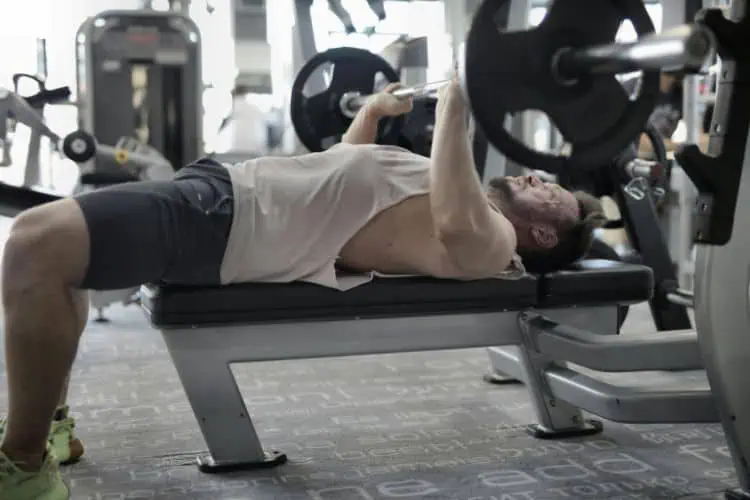

Flat bench exercises are a cornerstone of strength training and bodybuilding routines. They target multiple muscle groups, enhance overall strength, and are pivotal for building a well-rounded chest. This blog post will explore the best flat bench exercises, their benefits, proper techniques, and tips for maximizing your results.
Benefits of Flat Bench Exercises
Flat bench exercises offer numerous advantages for fitness enthusiasts, including:
- Muscle Development: They primarily target the pectoral muscles while engaging secondary muscles like the deltoids and triceps.
- Strength Gains: These exercises are excellent for increasing upper body pushing strength.
- Versatility: The flat bench is suitable for various exercises, from barbell presses to dumbbell flyes.
- Improved Stability: Performing exercises on a flat bench helps improve core and shoulder stability.
- Accessibility: Most gyms have flat benches, and they are easy to integrate into home gym setups.
Essential Flat Bench Exercises
1. Flat Barbell Bench Press
The flat barbell bench press is a classic compound exercise that focuses on the chest, triceps, and shoulders.
How to Perform:
- Lie flat on the bench with your feet firmly planted on the ground.
- Grip the barbell slightly wider than shoulder-width.
- Unrack the bar and lower it to your chest, keeping your elbows at a 45-degree angle.
- Press the bar back to the starting position, ensuring full arm extension.
Tips:
- Keep your back slightly arched but maintain contact with the bench.
- Avoid flaring your elbows excessively to reduce shoulder strain.
- Use a spotter for safety during heavy lifts.
2. Flat Dumbbell Bench Press
The flat dumbbell bench press offers a greater range of motion compared to the barbell variation and helps improve muscle symmetry.
How to Perform:
- Lie flat on the bench holding a dumbbell in each hand.
- Start with the dumbbells above your chest, palms facing forward.
- Lower the dumbbells slowly to the sides of your chest.
- Push them back to the starting position, focusing on control.
Tips:
- Use a weight you can control throughout the movement.
- Keep your wrists straight to avoid unnecessary strain.
Accessory Flat Bench Exercises
1. Flat Dumbbell Flyes
Dumbbell flyes are an isolation exercise targeting the chest while minimizing tricep engagement.
How to Perform:
- Lie on a flat bench with a dumbbell in each hand, palms facing each other.
- Start with the dumbbells above your chest.
- Slowly open your arms in a wide arc, lowering the dumbbells to shoulder level.
- Bring the dumbbells back to the starting position, squeezing your chest muscles.
Tips:
- Avoid overstretching at the bottom of the movement.
- Keep a slight bend in your elbows to protect your joints.
2. Close-Grip Bench Press
The close-grip bench press emphasizes the triceps while still engaging the chest and shoulders.
How to Perform:
- Lie flat on the bench and grip the barbell with your hands closer than shoulder-width.
- Lower the barbell to your chest, keeping your elbows close to your body.
- Press the barbell back up to the starting position.
Tips:
- Keep your elbows tucked in to avoid shoulder strain.
- Focus on a controlled tempo for better tricep activation.
Advanced Flat Bench Exercises Variations
1. Paused Bench Press
The paused bench press is a variation of the flat barbell bench press that involves pausing at the bottom of the lift to improve strength and stability.
How to Perform:
- Perform a regular bench press but pause for 1–3 seconds when the barbell touches your chest.
- Maintain tightness and press the bar back up.
Benefits:
- Builds explosive strength.
- Improves control and stability.
2. Tempo Bench Press
The tempo bench press involves slowing down certain parts of the lift to increase time under tension.
How to Perform:
- Lower the barbell slowly (3–5 seconds) to your chest.
- Pause briefly at the bottom.
- Explode back to the starting position.
Benefits:
- Enhances muscle endurance.
- Increases hypertrophy.
Flat Bench Workouts for Beginners
Sample Routine
- Warm-up: 5–10 minutes of dynamic stretches and light cardio.
- Flat Barbell Bench Press: 3 sets of 8–10 reps.
- Flat Dumbbell Bench Press: 3 sets of 10–12 reps.
- Dumbbell Flyes: 3 sets of 12–15 reps.
- Cool-down: Stretching focusing on the chest and shoulders.
Common Mistakes To Avoid With Flat Bench Exercises
- Skipping Warm-ups: Always warm up to prepare your muscles and joints.
- Lifting Too Heavy: Use weights you can handle with proper form.
- Poor Bench Setup: Ensure your bench is stable and properly aligned.
- Neglecting Full Range of Motion: Perform each exercise through its full range to maximize results.
- Lack of Progression: Gradually increase weights or reps to continue making gains.
Tips for Success
- Focus on Form: Prioritize technique over weight to prevent injuries.
- Incorporate Variety: Mix flat bench exercises with incline and decline variations.
- Track Your Progress: Keep a workout log to monitor your improvements.
- Rest and Recover: Allow your muscles time to recover with adequate rest and sleep.
- Balanced Training: Pair bench exercises with pulling movements like rows to maintain muscular balance.
Flat bench exercises are essential for anyone looking to build upper body strength and size. From the classic bench press to advanced variations, there’s something for everyone. By following proper techniques, avoiding common mistakes, and incorporating these exercises into your routine, you can achieve your fitness goals effectively.







Leave a Comment